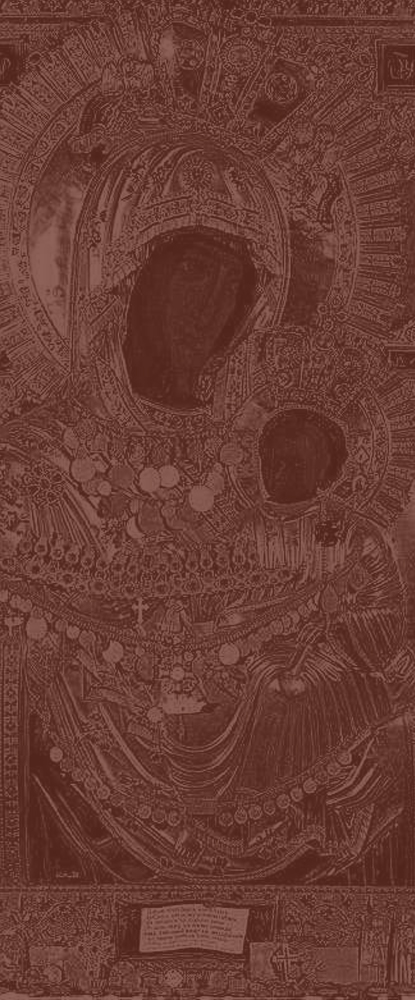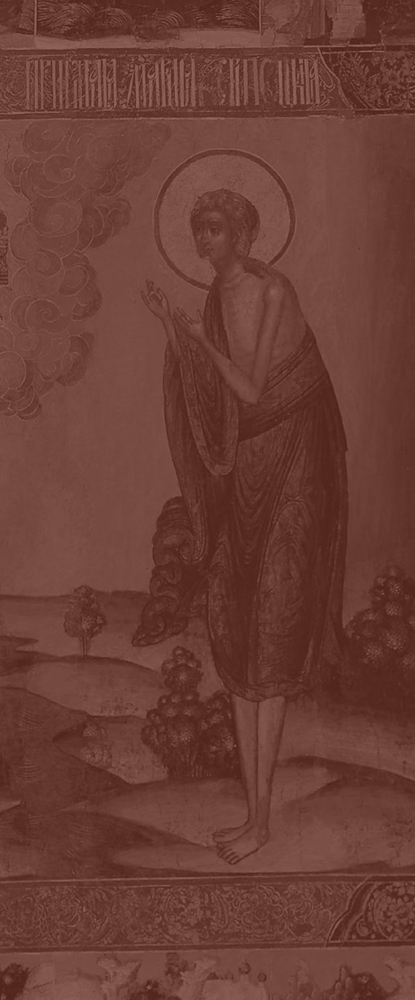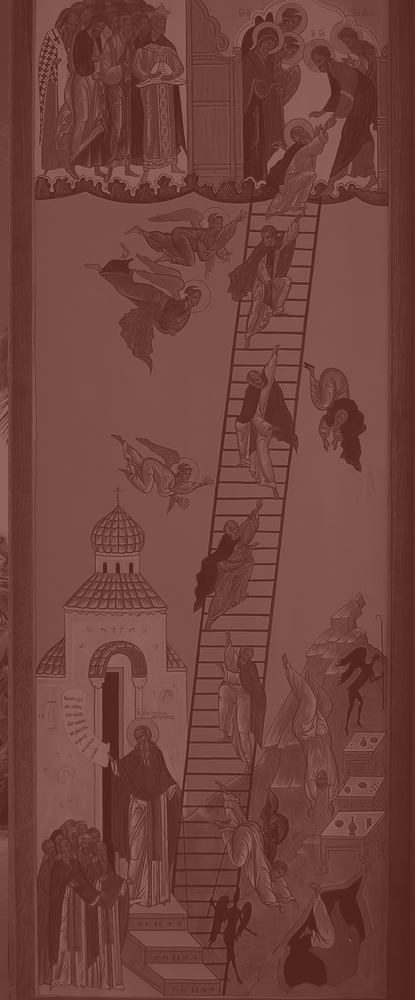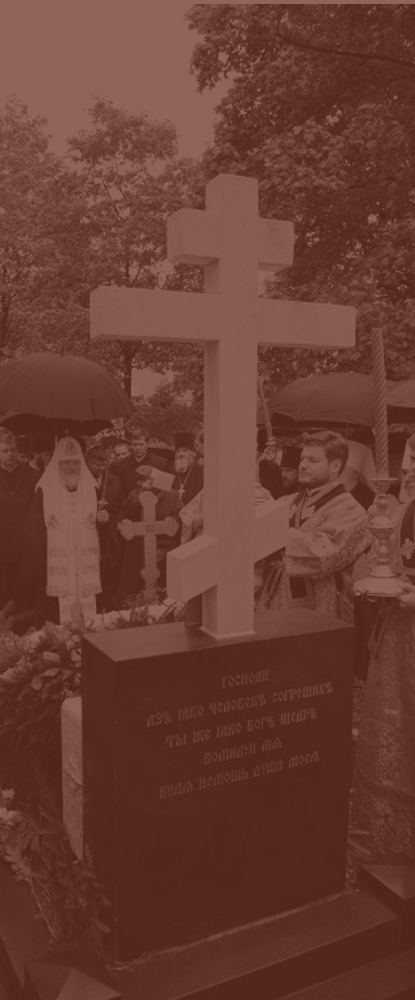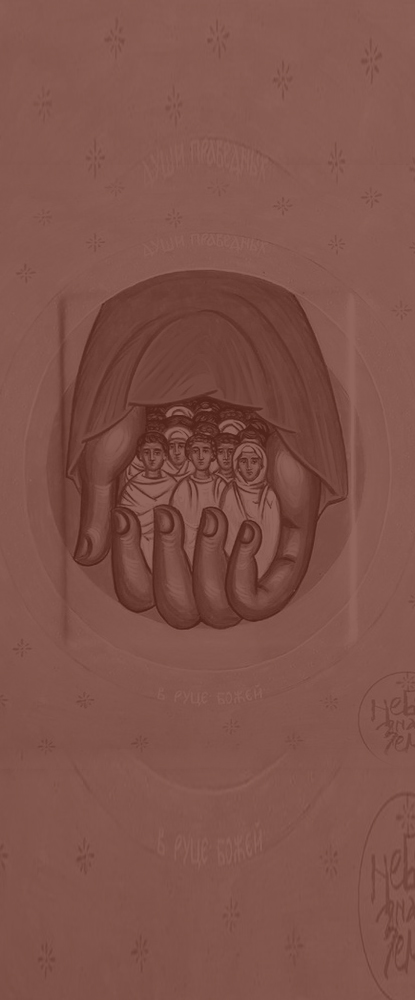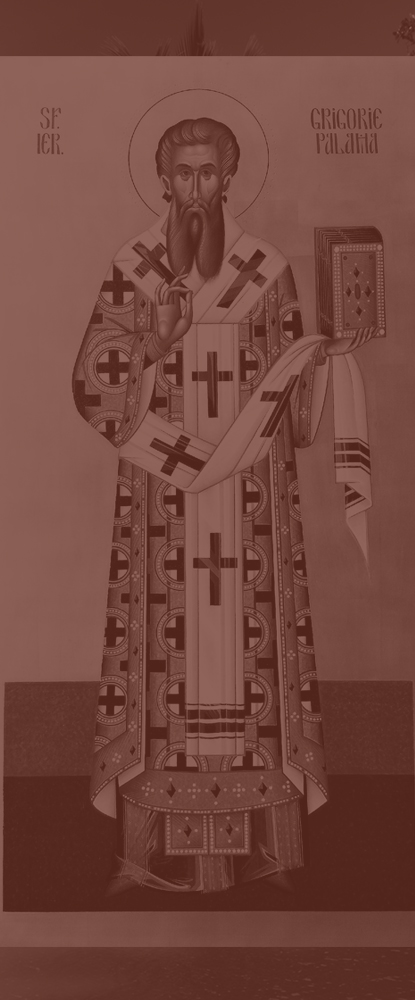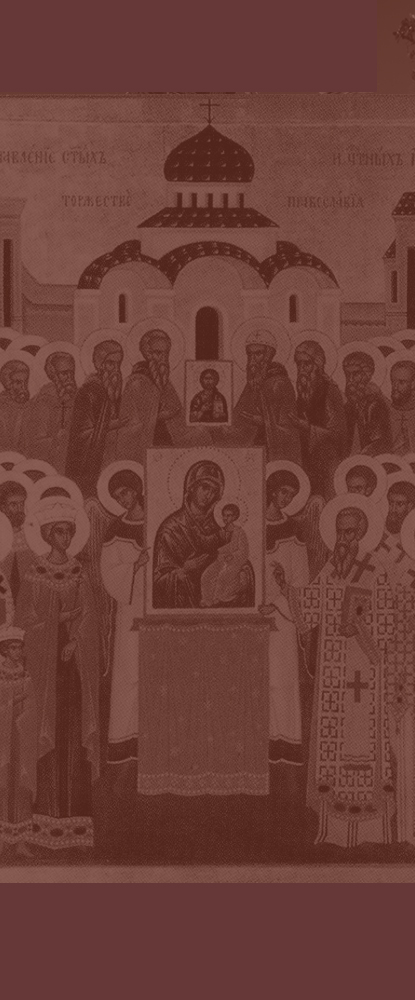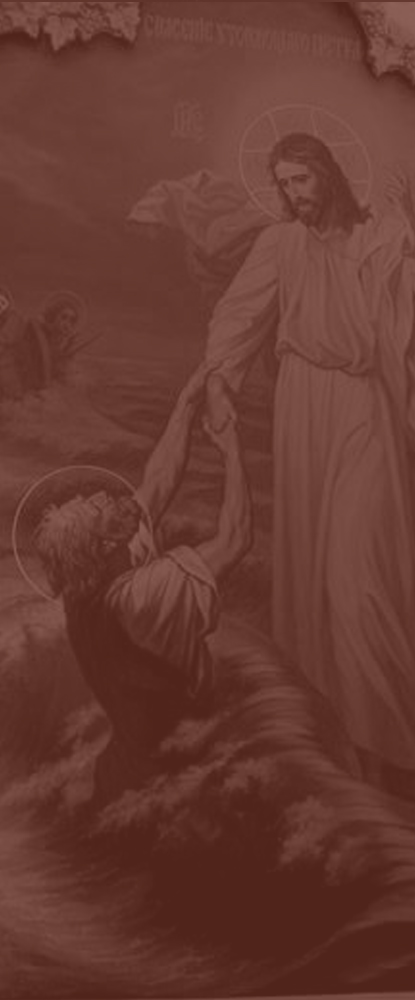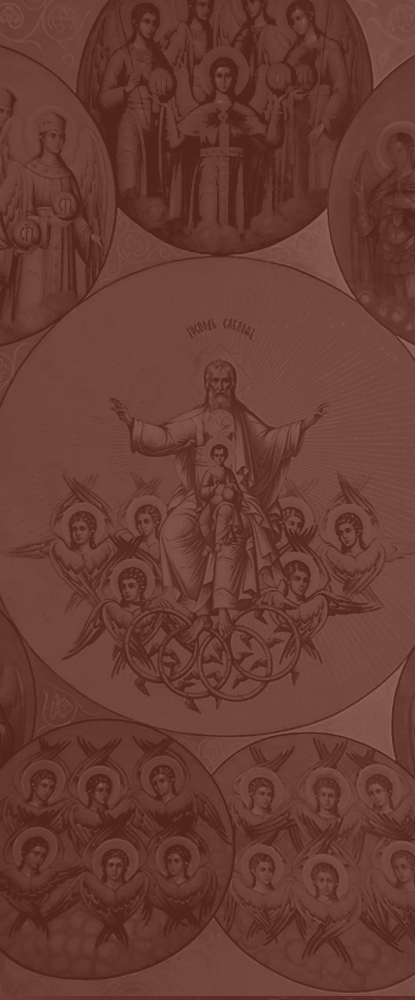HAND IN HAND WITH CHRIST
Sermon for the Sunday of Saint Gregory Palamas. 12.03.2023
In the name of the Father, and of the Son, and of the Holy Spirit!
Today’s second Sunday of Great Lent is dedicated to Saint Gregory Palamas, Archbishop of Thessaloniki. Do you know the story of Saint Gregory Palamas? Yes, he was an Athonite monk, he strived on Holy Mount Athos. The monastic tradition has existed on Holy Mount Athos for a thousand years to this day. This island has belonged to monks for a thousand years already. There are no secular inhabitants there. For a thousand years, it lawfully exists as a men’s monastic republic where no woman has ever set her foot. This is not because someone disdains women, but because this is simply a men’s monastic island, a men’s maritime republic of people who gathered there united by one common theme of monasticism and who dedicate their whole attention and lives to Christ.
When monks are tonsured they make vows, and one of the vows is agamy. One more is staying at the place where you were tonsured and remain obedient to the Elder, before whom you bowed and who tonsured you, until the end of your life. The monastics make vows to observe not only the purity or chastity of their bodies. Also at tonsure they are given their prayer ropes, which symbolize not only a simple prayer, but a prayer which helps them to keep their inward chastity, a chastity of mind. Look, even the notions of “thoughts” and “ideas” are different. Not only a long thought, but also a short idea should not let you be somewhere outside of Christ.
This amazing place exists until now and attracts thousands of pilgrims from all over the world. As the world has lost Christ to some measure.
Seeking after Christ, I traveled a lot around the world. I visited Athos more than forty times, but also I visited many other places on our planet, involuntarily getting up close and personal to them. I went to America not for the sake of seeing America, but to find a person there, who was an Athonite monk and who opened nineteen monasteries in America. He created the monasteries in the way that their inhabitants live like Athonites in seeking after Christ, in concentration, in Christ. I was in England, but not for seeing England, its Parliament or other places of interest. I went there because there lived a person there, who founded a monastery. This man was Father Sophrony Sakharov, who dedicated his whole life to seeking Christ too.
In pursuit of the theme of Christ, I involuntarily traveled to these countries and I saw that the major part of their population lives in a post-Christian epoch. These countries used to be Christian. Old Europe is full of churches, but they are all dead. Who discovered America? Christians did. America is dead for Christ now.
Meanwhile Athos is a unique place, this theme still exists there. Everyone lives by one theme, desire and aspirations. Everyone talks about Christ and with Christ. Everyone does not simply take their prayer ropes with them, but they use them as a link with Christ. It is like a thread, Christ holds one end and I hold another. Do you remember, when we were at the kindergarten, the teacher tied us to a rope, if we went somewhere? We went in a straight line after the teacher, our caregiver, without deviating to any side. The same way a monk holds his prayer rope. One part of it in his hand, another, in Christ’s. He holds to Christ saying without ceasing, “Jesus, Jesus, Jesus, Jesus, Jesus.”
Saint Gregory Palamas lived in the XIV century. He was an Athonite monk and inherited the Athonite tradition to the full extent. These traditions belonged to the people who abandoned all the joys of this world, they refused a family, marriage, art, science, and traveling. They closed themselves on this island, and even more, in the space of the island, they closed themselves in a dark cell. For those who have never come across monasticism and who do not understand it, this all seems to be a prison, a prison for the human soul. Our souls are always anxious for impressions, pleasure and happiness. But people suddenly close themselves voluntarily in this prison of a dark cell. However, other people see life in their eyes. And not simply life, but a sparkle of joy. They see the Divine Light in the eyes of those people who live by it. After a meeting with such a monk, people’s stereotypes and insight into monasticism change. A monk is in a prison of his cell, but his eyes beam with joy. At the same time, I cling to the joys of this world and I am always exhausted, I have neither life nor joy in me. Why is this so? What is so special about them?
Regarding the story of Saint Gregory Palamas, we know he was an Athonite monk, and we are acquainted with his works on prayer, on the Jesus prayer in particular. There is one more historical fact we know about him. A controversy he engaged in. Sometimes a false humility tells Christians, “Do not meddle in anything, do not argue with anyone, do not do anything.” And all of a sudden an Athonite monk leaves Athos in order to argue. He leaves his cell to meet his opponent. What made him do this? He cared for God and came out to defend Him. He came out to protect Christ and the experience of the Athonite monasticism.
The story tells us there was a Greek, who came to Byzantium from Rome, where he acquired his education. Catholicism has very strong science, intellectual and scholastic science. This man, his name was Barlaam, was a scholar who gained a very good education there, in the West. When he came back to his motherland, Byzantium, due to his education, he was accepted at the emperor’s court with honor. People listened and paid attention to him. This man came back and brought not only knowledge, but also self-opinion with him. It seems to him that his intellectual theoretical knowledge allows him to judge practice. He came to Athos to become acquainted with the Athonite tradition of monasticism. In the innocence of their heart, the Athonites told him about their practice of the Jesus prayer. Like little children, they revealed to him about what was happening to them. They opened the state of contemplation during the Jesus prayer before him. The state of contemplation is a unique state, when a person comes out of the format of this world and steps into the space of the Divine world, into the parallel world. There, everything happens in a drastically different way. As Saint Paul the Apostle said, “I saw it, but I cannot tell you what I saw, as the things I saw were not of this world. I heard, but I cannot explain what I heard, as there are no earthly words to describe this.”
When Barlaam came to Athos and the monks told him about their states of contemplation, he did not understand them, as he had never experienced this. He had never been in such a state. It would be a different matter if he only did not understand them, but he began to laugh at them, moved by his pride and arrogance. He said, “They are insane. This is spiritual exaltation. They are impassioned and in a state of delusion. Everything they see is a mere illusion.”
Saint Gregory Palamas, who could simply remain in his cell and have no argument with anyone and keep his inner peace, comes out to meet his opponent and says, “You are a madman, stop. Who do you argue with? You studied theory, but you are standing before those who practice and those who do not know this spiritual world from books, but live in it every day, every night and every hour.”
He does not leave Athos because Barlaam had significant authority being highly educated, but because a part of the population of Byzantium leaned towards his side. However, a part of people heard and sided with the authority of Saint Gregory Palamas. Even a church council gathered to discuss this issue. The Athonites said during the moment of contemplation, they saw Divinity as the Uncreated Light, the Light of Transfiguration. To which Barlaam said, “This is a simple physical light.” Saint Gregory insisted, “No, this is a Divine Light.” Glory to God, His truth defeats this heretic through Gregory Palamas. However, Barlaam confused many people, he was not alone. He had a follower Acindynus after him.
Regarding the essence of this controversy. This was not even an argument about the Uncreated Light, and not about the way people see God. Most probably, this is an argument on the knowledge of God. In the end, Saint Gregory proved that God is not experienced through intellect.
Intellect works with the space of this physical world. Meanwhile, God is a subtler and higher issue. Intellect always hits a wall. Hitting a wall, instead of admitting its limitedness, it says out of its pride, “God does not exist.” In fact, you have come to a dead end and God does not exist in this state for you. God does not belong to an intellectual realm, He belongs to the realm of being. You cannot speculate about God, or rather, you can, but you will never meet God in this way. You will always talk about God, talk much and in a complicated way, but you will never meet Him. You will meet God in the state of prayer. This is not a state of reasoning or thinking, this is a state of miracle. God has come and everything fell into place. There are no more questions. Here I am, here is God. Amen. All speculations only interfere. This was the essence of the controversy.
Even now, a part of churched people tries to seek God through intellect. They go to church throughout their lives, but have no result… You know, once an Abbess, an acquaintance of mine whom I loved very much and who is deceased now, told me during our conversation about prayer, “Father Sergiy, I have been a nun for fifty years and an Abbess for twenty-five years already. I know how to build, to sing, I know the Church canons and how to manage a monastery. But I do not know how to pray.” No, she knows how to read the Psalter, to sing at a service and hold the midnight office. Nevertheless, in the end of her life, she realized that praying and reading are not the same things. You may read and read until you read it to tatters, and you may sing until you lose your voice. But there will be no God. Not at all. Prayer is when God is there. You and God.
The previous week, the first one, was dedicated to the Triumph of Orthodoxy. Look, now is the second week and the Church gives it to one person, Saint Gregory Palamas. The Church empathizes how deep are the spiritual moments he touched upon, explained, and won in a controversy about them. By his prayers, O Lord, let us not only walk, but have something happening to us, so we stop saying “Jesus, Jesus, Jesus” to the emptiness. Sometimes people say, “I am tired of listening about Christ, show me Christ Himself. I want to meet Him so badly.” Unfortunately, even those people who go to church all their lives long say these words.
This happened to our beloved Father John of Kronstadt. He did not simply go to church, but walked hand in hand with Christ.
Glory to our God, always, now and ever, and unto the ages of ages! Amen!
